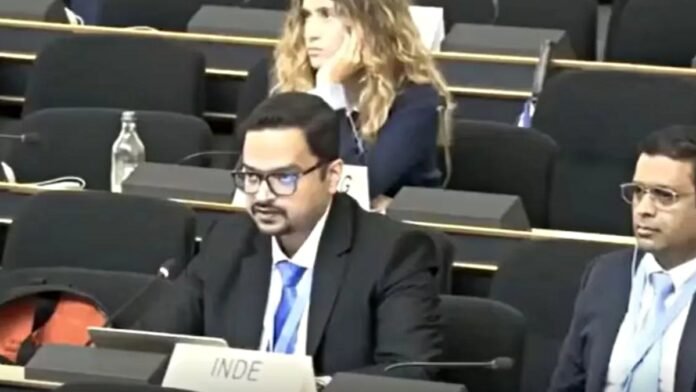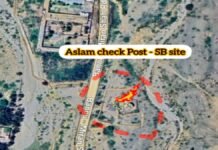
Key points
- At UNHRC’s 60th session in Geneva, India urged Pakistan to vacate Pakistan-occupied Jammu & Kashmir (PoJK) and rebutted its allegations.
- Indian delegate Kshitij Tyagi accused Pakistan of enabling terrorism and committing persistent human rights violations.
- India highlighted reported air strikes in Tirah Valley, Khyber Pakhtunkhwa, that killed around 30 civilians, triggering street protests.
- Tyagi said Pakistan should end military action against its own people and focus on stabilizing its “economy on life support.”
- India reiterated that Pakistan’s “duplicitous” policies are exposed internationally and must end, including shelter to banned groups.
- Protests in Khyber Pakhtunkhwa entered a second day, with local MLA Abdul Ghani Afridi demanding accountability.
Geneva: At the 60th session of the United Nations Human Rights Council (UNHRC) in Geneva, India delivered a forceful rebuttal to Pakistan, urging it to withdraw from Pakistan-occupied Jammu and Kashmir (PoJK) and stop targeting its own civilians. Indian representative Kshitij Tyagi said Pakistan’s record on terrorism and human rights is under mounting global scrutiny and cannot be masked by false allegations against India.
What India said at UNHRC
Responding to a Pakistani diplomat’s remarks, Tyagi said the forum was being misused with “baseless and provocative” claims against India. He asserted that Pakistan must first address its deep domestic crises rather than “eyeing Indian territory,” arguing that the priority should be stabilizing an “economy on life support.” He underscored India’s position that Pakistan should vacate all Indian territories under its illegal occupation and cease supporting individuals and entities banned by the international community.
Focus on Khyber Pakhtunkhwa civilian deaths
India’s statement spotlighted the humanitarian fallout of recent military actions in Pakistan’s northwest. Citing reports from the Tirah Valley in Khyber Pakhtunkhwa, Tyagi referenced bombings that left nearly 30 civilians dead, including women and children, and sparked widespread anger. The locality has seen residents pour onto the streets for a second consecutive day. Khyber Pakhtunkhwa Assembly member Abdul Ghani Afridi, who joined demonstrators, said: “Silence will no longer be tolerated. The blood of the innocent will be held accountable, and our struggle will continue until justice is served.”
End military dominance and terror ecosystems
Calling for structural reforms, India urged Pakistan to end military dominance over civilian life, improve the humanitarian situation, and dismantle terror ecosystems. That includes halting support and safe haven for groups and individuals sanctioned or proscribed internationally. India argued that continued bombings and military operations against local populations are eroding regional stability and further undermining international confidence in Pakistan’s commitments.
India’s position on J&K and international context
Reiterating its long-held stance, India said Jammu and Kashmir, including areas under Pakistan’s occupation, are integral parts of India, and that Pakistan must withdraw from these territories. New Delhi has repeatedly conveyed this at multilateral platforms, asserting that Pakistan’s rights discourse is contradicted by its own track record and the fostering of cross-border terrorism. India maintained that the international community is increasingly aware of these contradictions, and that “duplicity” has now been exposed.
What’s next
- India is expected to keep pressing its case at Geneva and other UN forums, linking terrorism, rights violations, and instability in Pakistan’s northwest to broader regional security risks.
- Civil society groups and local leaders in Khyber Pakhtunkhwa are likely to intensify calls for accountability and an impartial inquiry into civilian deaths in Tirah Valley.
- Diplomatic attention will remain on whether Pakistan initiates credible steps to protect civilians, curb military excesses, and act against internationally banned outfits.




















































